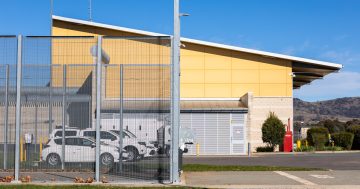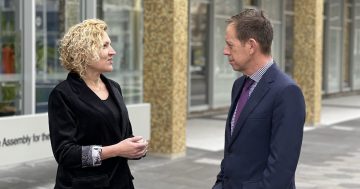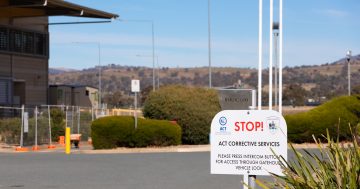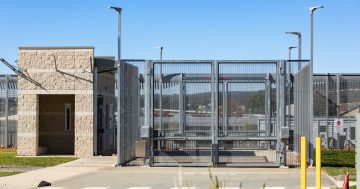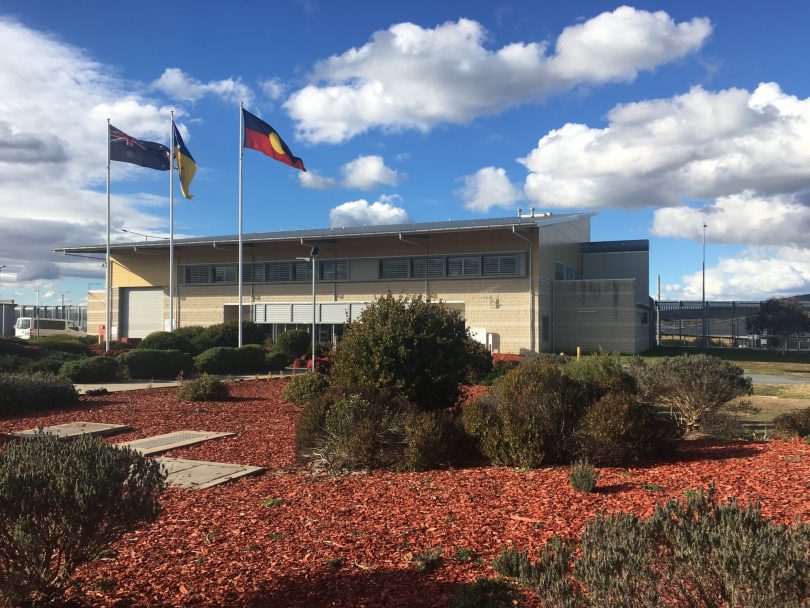
An inmate from Canberra’s jail falsely declared a close contact for a COVID-19 case left custody without being offered a test for the virus. Photo: File.
14 September, 5:45 pm: A man from Jervis Bay was brought to Canberra’s jail, falsely declared a COVID-19 close contact then allowed to leave prison without being offered a test for the virus.
After he was granted bail, he was released with no money, no identification and authorities had no plan to get him back home.
On Tuesday (14 September), after the case was heard in the ACT Magistrates Court several times, managing solicitor of the Aboriginal Legal Service’s Canberra office Dean Rutherford said the whole process had been “completely unsatisfactory”.
“There appears to have been very little thought that went into the decision to transport our client from Jervis Bay to Canberra in this current climate – and even less consideration of the consequences of that decision,” he said.
“In the result, we were left with a young Aboriginal man unnecessarily and unjustly incarcerated.
“The police and Corrective Services need to be held accountable for this.”
The man, who has been charged with family violence-related offences, lives in the Jervis Bay Territory, where the laws of the ACT apply.
He was arrested in Jervis Bay on 2 September and taken to the Alexander Maconochie Centre (AMC) the next day.
On 11 September, authorities said he was a close contact of a positive COVID-19 case at the AMC. After he was granted bail that day, he was supposed to be taken to a quarantine facility at the Australian National University.
However, several hours later, authorities said he was not actually a close or even secondary contact so he was not allowed to stay at the facility. He was taken to a caravan park instead, still without being tested for coronavirus.
On Tuesday (14 September), the man’s Aboriginal Legal Service lawyer Lauren Skinner told the ACT Magistrates Court he was being taken by his brother back to Jervis Bay where he would isolate for 14 days after he arrived.
While ACT Health said he wasn’t a close or casual contact, his brother will take him to be tested for the virus, she said.
Special Magistrate Jane Campbell told the court it struck her as “odd” that the man was able to leave the AMC without authorities organising for him to be tested for COVID-19.
She said he had gone from being identified as a close contact to being identified as no contact.
Also, she said the fact he had been released on bail in Canberra having been arrested without money or identification had resulted in “quite an unjust situation”. But she was pleased to see he was on his way back to Jervis Bay.
Magistrate Campbell said there needed to be some consideration about how defendants brought to Canberra from the Jervis Bay Territory were to be returned and she encouraged discussion on the subject.
Mr Rutherford said the case was another example of why there needed to be a Royal Commission into Aboriginal and Torres Strait Islander’s experiences in the ACT justice system, including incarceration and factors that bring Aboriginal people in touch with the system.
The man will appear in Jervis Bay Courthouse for a hearing in October.
UPDATED 15 September, 10:00 am: The Justice and Community Safety Directorate (JACS) provided comment to Region Media on 15 September.
JACS said due to privacy laws the ACT Government was unable to provide information about whether a particular detainee has been vaccinated or tested for COVID-19.
But the spokesperson said the man from Jervis Bay was initially treated as a close contact of the positive COVID-19 case out of an abundance of caution, but upon further investigation he was deemed by ACT Health not to be a close or casual contact.
They also said ACT Corrective Services has no legal basis to transfer a detainee once they are released on bail.
But the JACS spokesperson said Corrective Services arranged and paid for three days of hotel accommodation to allow the man time to satisfy his bail conditions.
“Following his release to the accommodation, Corrections staff continued contact with the detainee to ensure his welfare,” they said.
“Furthermore, Corrections staff visited the detainee the following day to provide him with additional support, including further food and other items.”












